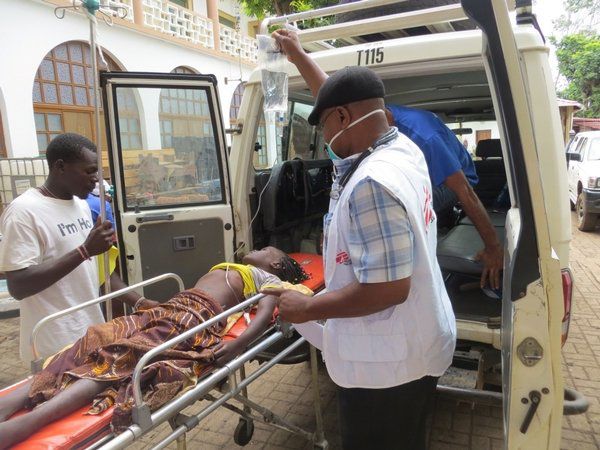Recent floods in Mozambique’s Gaza province have devastated the city of Chokwe, putting the main hospitals and health structures out of action and leaving people in urgent need of medical care. In response, teams from Médecins Sans Frontières (MSF) are bringing in extra staff and medical supplies, and working to get the health facilities up and running again.
The wards of the city’s 120-bed referral hospital in Chokwe – 225 kilometres of capital Maputo- was deluged with mud and floodwater. MSF teams are working to reopen a section of the hospital, and hope that 10 to 15 beds will be ready for patients in the coming hours.
“More and more people are coming back to a devastated city where public services have not yet been reestablished,” says MSF country director Reveka PAPADOPOULOU. “Our teams have witnessed an increased number of severely ill patients who need hospital care.”
Since arriving in Chokwe on 30 January, MSF staff have provided more than 10,000 medical consultations. “We are seeing an average of 700 patients per day, and sometimes more,” says MSF nurse Amelia MACUACUA. “We are referring 15 to 20 severely ill patients to other hospitals in the district which are functioning but are already overloaded.”
“It took time for the relevant parties to acknowledge the urgent health and sanitation needs,” says Papadopoulou, “but we are now confident that we will see the rural hospital in Chowke open for patients very quickly. Our support will include providing general healthcare and essential medical supplies. We will also work on getting the basic infrastructure – like sanitation and electricity – up and running.”
More than 3,300 of MSF’s medical consultations so far have been for HIV-positive patients in need of antiretroviral medicines or counselling, with 900 for people suffering from malaria.
MSF teams are closely monitoring possible outbreaks of disease in the district. “We are seeing an increased in malaria cases at this point,” says emergency field coordinator Dr Maria-Celeste EDWARDS. “There is a clear upward tendency compared to last year but we are not yet sure how serious this hike is. The elevated numbers could be partly related to the intensified surveillance.”
MSF is reinforcing its capacity to respond, with more staff on their way to Chokwe and extra medical supplies expected to reach Gaza province this week.
MSF has been working in Mozambique since 1984. The medical organisation provides antiretroviral treatment to 33,000 HIV-positive patients in the country.
The wards of the city’s 120-bed referral hospital in Chokwe – 225 kilometres of capital Maputo- was deluged with mud and floodwater. MSF teams are working to reopen a section of the hospital, and hope that 10 to 15 beds will be ready for patients in the coming hours.
“More and more people are coming back to a devastated city where public services have not yet been reestablished,” says MSF country director Reveka PAPADOPOULOU. “Our teams have witnessed an increased number of severely ill patients who need hospital care.”
Since arriving in Chokwe on 30 January, MSF staff have provided more than 10,000 medical consultations. “We are seeing an average of 700 patients per day, and sometimes more,” says MSF nurse Amelia MACUACUA. “We are referring 15 to 20 severely ill patients to other hospitals in the district which are functioning but are already overloaded.”
“It took time for the relevant parties to acknowledge the urgent health and sanitation needs,” says Papadopoulou, “but we are now confident that we will see the rural hospital in Chowke open for patients very quickly. Our support will include providing general healthcare and essential medical supplies. We will also work on getting the basic infrastructure – like sanitation and electricity – up and running.”
More than 3,300 of MSF’s medical consultations so far have been for HIV-positive patients in need of antiretroviral medicines or counselling, with 900 for people suffering from malaria.
MSF teams are closely monitoring possible outbreaks of disease in the district. “We are seeing an increased in malaria cases at this point,” says emergency field coordinator Dr Maria-Celeste EDWARDS. “There is a clear upward tendency compared to last year but we are not yet sure how serious this hike is. The elevated numbers could be partly related to the intensified surveillance.”
MSF is reinforcing its capacity to respond, with more staff on their way to Chokwe and extra medical supplies expected to reach Gaza province this week.
MSF has been working in Mozambique since 1984. The medical organisation provides antiretroviral treatment to 33,000 HIV-positive patients in the country.


